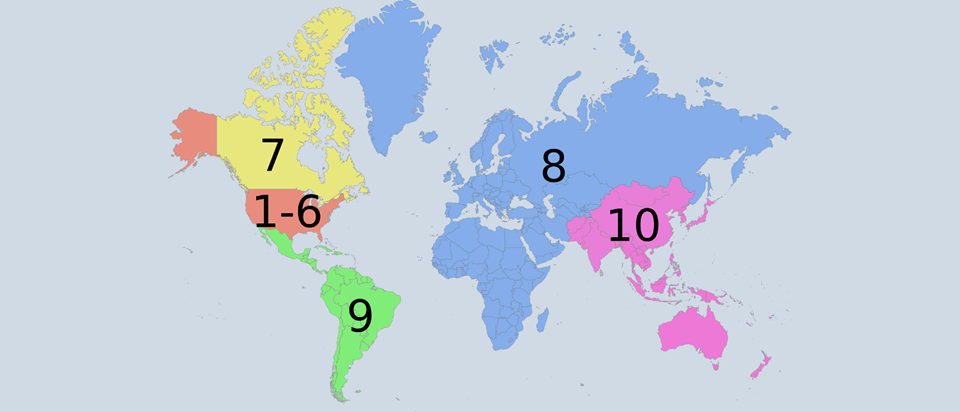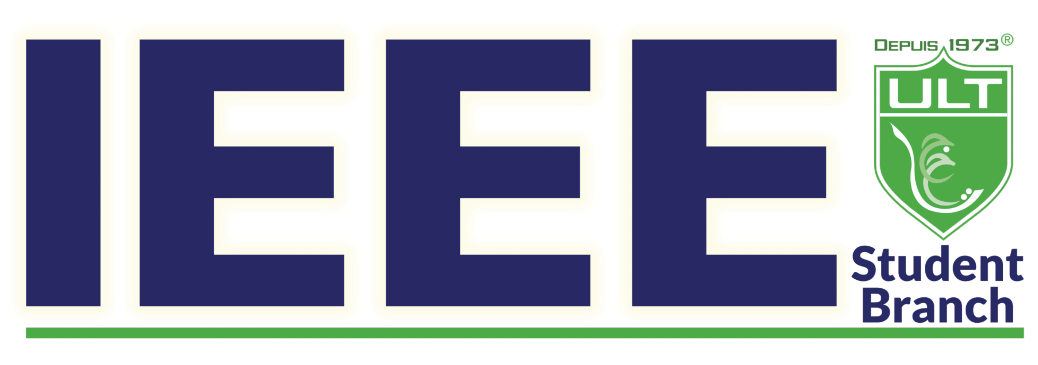- Institute of Electrical and Electronics Engineers is the world’s largest technical professional organization for the advancement of technology.
- Inspire a global community to innovate for a better tomorrow through its highly cited publications, conferences, technology standards, and professional and educational activities. IEEE is the trusted “voice” for engineering, computing, and technology information around the globe.
History:
-
- 1884 —> Foundation of the AIEE (American Institute of Electrical Engineers )
-
- 1912 —> Foundation of the IRE (Institute of Radio Engineers)
-
- 1963 —> the AIEE and the IRE merged to form the Institute of Electrical and Electronics Engineers, or IEEE. At its formation, IEEE had 150,000 members, 140,000 of whom resided in the United States.
Regions

IEEE has:
- More than 419,000 members in more than 160 countries, more than 50 percent of whom are from outside the United States
- More than 124,000 Student members
- 342 Sections in ten geographic Regions worldwide
- 1,834 Chapters that unite local members with similar technical interests
- 3,422 Student Branches at colleges and universities in over 100 countries
- 2,600 Student Branch chapters of IEEE technical societies
- 568 affinity groups; IEEE affinity groups are non-technical sub-units of one or more Sections or a Council. The affinity group patent entities are the IEEE-USA Consultants’ Network, Young Professionals (YP), Women in Engineering (WIE), Life Members (LM), and IEEE Entrepreneurship
IEEE:
- Has 39 technical Societies and seven technical councils representing the wide range of IEEE technical interests
- More than 5 million documents in the IEEE Xplore® digital library, with more than 12 million downloads each month
- Has over 1,200 active standards and more than 650 standards under development
- Publishes approximately 200 transactions, journals, and magazines
- Sponsors more than 1,900 conferences in 103 countries while:
- Partnering with more than 1,400 non-IEEE entities globally
- Attracting more than 547,000 conference attendees
- Publishing more than 1,800 conference proceedings via IEEE Xplore
Membership:
There are more than 419,000 IEEE members in over 160 countries, more than 50 percent of whom are from outside the United States. IEEE members are engineers, scientists, and allied professionals whose technical interests are rooted in electrical and computer sciences, engineering, and related disciplines.
The highest grade of membership, IEEE Fellow, is attained through nomination by peers and approval by the IEEE Board of Directors for distinction in the profession.
Communities:
As the world’s largest technical professional organization, IEEE offers a number of ways to get involved with technical and local communities. These communities are active participants in research and authorship, conferences, and important conversations about today’s most relevant technical topics locally and globally.
With 39 technical Societies, ten geographic regions that host over 10,000 local meetings annually, several affinity and special interest groups, humanitarian opportunities, and virtual communities and private groups through IEEE Collabratec®, IEEE offers ample opportunity to network and grow professionally through communities.
Conferences
IEEE sponsors more than 1,900 annual conferences and events worldwide, curating cutting-edge content for all of the technical fields of interest within IEEE.
Publications:
IEEE publishes nearly a third of the world’s technical literature in electrical engineering, computer science, and electronics. This includes approximately 200 transactions, journals, and magazines published annually. In cooperation with John Wiley and Sons, Inc., IEEE also produces technical books, monographs, guides, and textbooks.
IEEE journals are consistently among the most highly cited in electrical and electronics engineering, telecommunications, and other technical fields.
The IEEE Xplore Digital Library contains more than 5 million documents from IEEE and IEEE journals, transactions, magazines, letters, conference proceedings, and active IEEE standards.
Learn more about IEEE publications
Standards
IEEE is a leading developer of international standards that underpin many of today’s telecommunications, information technology, and power-generation products and services.
Often the central source for standardization in a broad range of emerging technologies, the IEEE Standards Association has a portfolio of over 1,300 standards and more than 600 standards under development. This includes the prominent IEEE 802® standards for local, metropolitan, and other area networks, including Ethernet and Wireless LAN (commonly referred to as Wi-Fi®).
Education
By awarding continuing education units and professional development hours, IEEE helps its members meet their continuing education requirements and develops products and services in support of these efforts.
IEEE follows strict guidelines for the development and delivery of continuing education materials, conforming to the highest industry practices for awarding continuing education units, professional development hours, and certificates of completion.
At the pre-college level, IEEE works with industry, universities, and government to raise students’ literacy in science, math, engineering, and technology.
Humanitarian
As the philanthropic partner of IEEE, the IEEE Foundation inspires the generosity of donors to enable IEEE programs that improve access to technology, enhance technological literacy, and support technical education and the IEEE professional community.
The IEEE Foundation, a tax-exempt 501(c)(3) organization in the United States, fulfills its purpose by:
- Soliciting and managing donations
- Recognizing the generosity of donors
- Supporting high-impact IEEE programs
- Awarding grants to IEEE grassroots projects of strategic importance
IEEE Foundation serves as a steward of donations that improve the human condition, empower the next generation of engineers and scientists, educate and raise awareness, energize and recognize innovation, and preserve the history of technology. With donor support, the IEEE Foundation strives to be a leader in transforming lives through the power of technology and education.
Learn more about the IEEE Foundation
IEEE is committed to advancing technology for the benefit of humanity. To support this effort, IEEE Humanitarian & Philanthropic Opportunities (IEEE H&P) brings together the wide range of IEEE programs that aim to do social good. Through IEEE’s diverse humanitarian and philanthropic programs, there are many opportunities to make a contribution—big or small—to improving the human condition worldwide. You can become involved at any stage of IEEE engagement through contributions of your time, talent, and treasure. Together, the strength and reach of the IEEE network can be leveraged to make a difference worldwide. Doing good brings great returns.
IEEE H&P makes it easy to:
- Become aware of the impact made by IEEE members and the possibilities
- Understand more about our programs
- Discover how you can engage through contributions of time, talent, and/or treasure
- Give back to help us improve how we are serving the community
Together, we can leverage the strength and reach of the IEEE network to make a difference worldwide.
Awards
Accomplishments in IEEE technical fields are recognized with annual awards for outstanding contributions to technology, society, and the engineering profession.
IEEE Medals are the highest awards that IEEE presents on behalf of the IEEE Board of Directors. IEEE Medals embrace significant and broad IEEE interests and purposes. The highest honor is the IEEE Medal of Honor, which recognizes an individual for an exceptional contribution or extraordinary career in the IEEE fields of interest. Past recipients have included such visionaries as:
- Guglielmo Marconi (1920, for radio telegraphy)
- William Shockley (1980, for junction, analog, and junction field-effect transistors)
- Andrew S. Grove (2000, for pioneering research in metal oxide semiconductor devices and technology)
- Gordon E. Moore (2008, for pioneering technical roles in integrated-circuit processing, and leadership in the development of MOS memory, the microprocessor computer and the semiconductor industry
- Mildred Dresselhaus (2015, for leadership and contributions across many fields of science and engineering)
